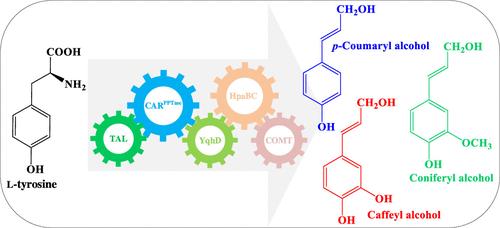当前位置:
X-MOL 学术
›
J. Agric. Food Chem.
›
论文详情
Our official English website, www.x-mol.net, welcomes your feedback! (Note: you will need to create a separate account there.)
Whole-Cell Bioconversion Systems for Efficient Synthesis of Monolignols from L-Tyrosine in Escherichia coli
Journal of Agricultural and Food Chemistry ( IF 5.7 ) Pub Date : 2024-06-20 , DOI: 10.1021/acs.jafc.4c02611 Mingtao Zhao 1 , Baohui Zhang 1 , Xiaofeng Wu 1 , Yi Xiao 1
Journal of Agricultural and Food Chemistry ( IF 5.7 ) Pub Date : 2024-06-20 , DOI: 10.1021/acs.jafc.4c02611 Mingtao Zhao 1 , Baohui Zhang 1 , Xiaofeng Wu 1 , Yi Xiao 1
Affiliation

|
Monolignols and their derivatives exhibit various pharmaceutical and physiological characteristics, such as antioxidant and anti-inflammatory properties. However, they remain difficult to synthesize. In this study, we engineered several whole-cell bioconversion systems with carboxylate reductase (CAR)-mediated pathways for efficient synthesis of p-coumaryl, caffeyl, and coniferyl alcohols from l-tyrosine in Escherichia coli BL21 (DE3). By overexpressing the l-tyrosine ammonia lyase from Flavobacterium johnsoniae (FjTAL), carboxylate reductase from Segniliparus rugosus (SruCAR), alcohol dehydrogenase YqhD and hydroxylase HpaBC from E. coli, and caffeate 3-O-methyltransferase (COMT) from Arabidopsis thaliana, three enzyme cascades FjTAL–SruCAR–YqhD, FjTAL–SruCAR–YqhD–HpaBC, and FjTAL–SruCAR–YqhD–HpaBC–COMT were constructed to produce 1028.5 mg/L p-coumaryl alcohol, 1015.3 mg/L caffeyl alcohol, and 411.4 mg/L coniferyl alcohol from 1500, 1500, and 1000 mg/L l-tyrosine, with productivities of 257.1, 203.1, and 82.3 mg/L/h, respectively. This work provides an efficient strategy for the biosynthesis of p-coumaryl, caffeyl, and coniferyl alcohols from l-tyrosine.
中文翻译:

用于在大肠杆菌中从 L-酪氨酸高效合成木质素单体的全细胞生物转化系统
木质素单体及其衍生物表现出多种药物和生理特性,例如抗氧化和抗炎特性。然而,它们仍然难以合成。在这项研究中,我们利用羧酸还原酶 (CAR) 介导的途径设计了多个全细胞生物转化系统,以便在大肠杆菌 BL21 (DE3) 中从 L-酪氨酸有效合成对香豆醇、咖啡醇和松柏醇。通过过表达来自约氏黄杆菌 (FjTAL) 的 L-酪氨酸解氨酶 (FjTAL)、来自红斑藻 (SruCAR) 的羧酸还原酶、来自大肠杆菌 (E. coli) 的乙醇脱氢酶 YqhD 和羟化酶 HpaBC,以及来自拟南芥 (Arabidopsis thaliana) 的咖啡酸 3-O-甲基转移酶 (COMT),三种构建了酶级联 FjTAL–SruCAR–YqhD、FjTAL–SruCAR–YqhD–HpaBC 和 FjTAL–SruCAR–YqhD–HpaBC–COMT,产生 1028.5 mg/L 对香豆醇、1015.3 mg/L 咖啡醇和 411.4 mg/L。从 1500、1500 和 1000 mg/L L-酪氨酸生产 L 松柏醇,生产率分别为 257.1、203.1 和 82.3 mg/L/h。这项工作为从 L-酪氨酸生物合成对香豆醇、咖啡醇和松柏醇提供了有效的策略。
更新日期:2024-06-20
中文翻译:

用于在大肠杆菌中从 L-酪氨酸高效合成木质素单体的全细胞生物转化系统
木质素单体及其衍生物表现出多种药物和生理特性,例如抗氧化和抗炎特性。然而,它们仍然难以合成。在这项研究中,我们利用羧酸还原酶 (CAR) 介导的途径设计了多个全细胞生物转化系统,以便在大肠杆菌 BL21 (DE3) 中从 L-酪氨酸有效合成对香豆醇、咖啡醇和松柏醇。通过过表达来自约氏黄杆菌 (FjTAL) 的 L-酪氨酸解氨酶 (FjTAL)、来自红斑藻 (SruCAR) 的羧酸还原酶、来自大肠杆菌 (E. coli) 的乙醇脱氢酶 YqhD 和羟化酶 HpaBC,以及来自拟南芥 (Arabidopsis thaliana) 的咖啡酸 3-O-甲基转移酶 (COMT),三种构建了酶级联 FjTAL–SruCAR–YqhD、FjTAL–SruCAR–YqhD–HpaBC 和 FjTAL–SruCAR–YqhD–HpaBC–COMT,产生 1028.5 mg/L 对香豆醇、1015.3 mg/L 咖啡醇和 411.4 mg/L。从 1500、1500 和 1000 mg/L L-酪氨酸生产 L 松柏醇,生产率分别为 257.1、203.1 和 82.3 mg/L/h。这项工作为从 L-酪氨酸生物合成对香豆醇、咖啡醇和松柏醇提供了有效的策略。











































 京公网安备 11010802027423号
京公网安备 11010802027423号